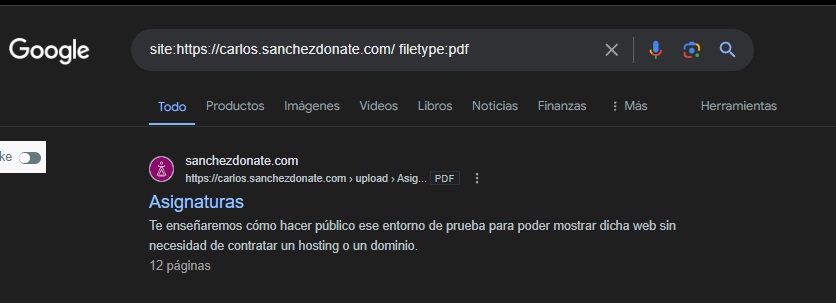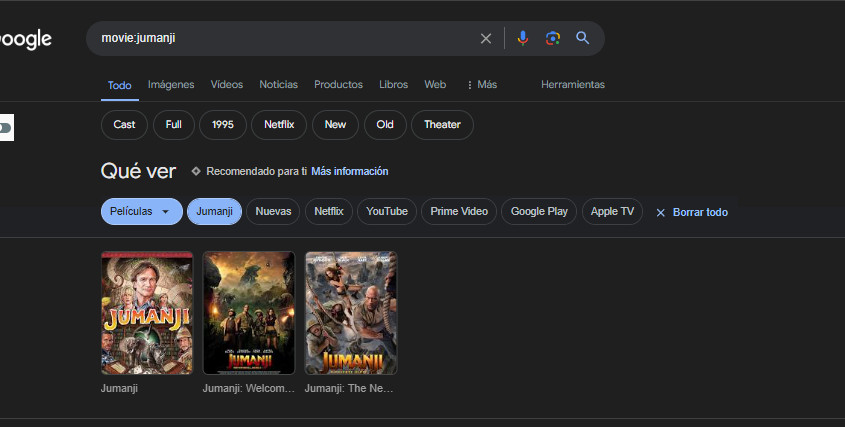Diference between Footprints and operators

The term Footprint should not be used to refer to Google operators.
This is an incorrect translation that has become popular in Spain and has been repeated and adopted, using an anglicism that, forgive me, but it shows a bit of ignorance.
Operators are those commands we can use in a search engine to perform a specific search, making our search more precise and advanced. On the other hand, Footprints would be the patterns that a particular type of website we are looking for might have.
Operators and footprints are not the same.
An operator is when we input a command into the search engine to make the search engine return specific results.
For example, when we input site:{domain.com}, we want it to return specific results only from that domain. What many blogs and SEOs in Spanish refer to as a "Footprint" is actually an operator.

You should enter the listed word along with the value you want to add to make the search more specific.
Limits the search to a specific website or domain.
site:https://carlos.sanchezdonate.com/
Allows you to view the source code of a page. It's the equivalent of control+U in Windows Chrome but lets you view the source code of a page easily from a mobile device.
view-source:https://carlos.sanchezdonate.com/
Allows you to search for a specific file type within your query (remember that operators are combinable, so you can search for a specific file type on a website).
carlos sanchez seo filetype:pdf

The operator related: has been deprecated and can no longer be used. It was used to find similar pages.
The command cache: will also disappear, although it is still functioning and present in the documentation without any changes.
By combining several operators, we can extract very useful information. For example, we can find all the sitemaps of NASA. Even though there is nothing in their robots.txt file, these sitemaps are indexed.

There are commands like src, which, although they make some difference in Google Images, are not significant, so I am omitting them.
Performs an exact search. Useful for precise searches.
Carlos Sánchez "SEO"
Searches for one term or another. Alternatively, you can use |.
This is ideal for comparisons where you want two specific products to appear.
cacao soluble colacao|nesquik healthier

Searches for both terms together. It is useful when combined with other operators. It is often said that there is no difference between using it and not using an operator directly, but let's see how the results vary.
Xiaomi AND 512GB AND pocophone

Xiaomi 512GB pocophone

Excludes a specific term.
Spanish omelette -onion

While it returns different results than without the wildcard, the practical use cases for this operator are limited.
Pizza of *
Can be used with $, € or £
mobile £100

The best part is that they can be combined:
Laptop (HP OR ASUS OR Lenovo) -PcComponentes -amazon -mouse -lenovo €1000

As you can see, in Shopping ads, although they try to be precise, some operators, such as "OR" or "-", are ignored, but SERPs usually respect them.
This does not mean that we will always find what we are looking for in this way.
intitle: - Words in the title.allintitle: - All words in the title.inurl: - Words in the URL.allinurl: - All words in the URL.intext: - Words in the text.allintext: - All words in the text.stocks: - Stock market information.movie: - Movie information.imagesize: - Searches for images of a specific size.
Sometimes we forget that beyond commands, Google has its own list of quite useful filters.

If we decide to click on advanced search, we have a useful and advanced option without needing to know any commands:

Regarding a Footprint, the literal translation of Footprint is footprint. The only thing that operators might have in common with Footprints is that sometimes we can use operators to find those footprints.
For example: Most websites using Shopify have the "collection" part indexable. This "collection" is a footprint that allows us to detect a website by typology.
Let’s say that Footprints are the patterns we can find to classify the result we want.
This can be used to find, for example, WordPress sites with vulnerabilities that give us access to certain folders:
inurl:"/wp-content/themes" -github -wordpress

Or, for example, we can see how certain companies using WordPress leave their databases exposed:
inurl:/wp-content/ filetype:sql -github

A footprint would be that WordPress by default generates a Sitemap with "wp-sitemap" in the URL. Therefore, we can easily get a list of WordPress sites:
filetype:xml inurl:wp-sitemap

Or, on the other hand, we can use these footprints to get sitemaps that are not from WordPress:
filetype:xml -inurl:wp- inurl:sitemap -wikipedia

We could do the same to extract sitemaps from PrestaShop:
filetype:xml - inurl:1_index_sitemap

We can also extract information from stores using Shopify:
intitle:clothing "Powered by shopify"

There are also other useful, advanced, and smart ways to use Google, such as alerts for terms we want to be informed about if there are updates in the SERPs:
I currently offer advanced SEO training in Spanish. Would you like me to create an English version? Let me know!
Tell me you're interestedIf you liked this post, you can always show your appreciation by liking this LinkedIn post about this same article.